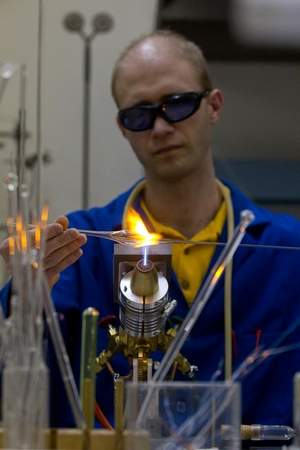The call, though, came from a group of frazzled researchers at Purdue University who had accidentally broken the very last glass instrument he’d made for them seven years earlier. But by that time, he’d long returned to working in nuclear engineering, his degree field.
“They couldn’t find anybody to recreate what I had done,” said Revis, 34, “so they were asking me questions about glass. I was still interested; I still had a passion for glass.”

So Revis, whose full first name is Benjamin, took a job as the University of Iowa’s sole glassblower. His duties include making or repairing whatever random glass instruments are needed in the chemistry, pharmacy, engineering and studio arts departments — basically any department in the university that needs something.
Revis’ customers and the items they ask him to make run the gamut. Sometimes a research group wants to perform an experiment but they can’t find the right tool. Sometimes they have a tool but they want to add to it or they want it made bigger or smaller.
“You dream it up and draw it on a piece of paper, and I will do my best to recreate it,” he said.
UI orders the countless glass beakers and test tubes used in experiments from external companies because they must meet strict international regulations.
Often, though, the assignments Revis gets are for experiments so technical even he doesn’t understand what they’re used for. Holding up a round glass piece with several valves coming off the top, almost like a heart, Revis explained that electrodes will go into the holes, and the device will be used in electrochemistry. He couldn’t explain much more than that.
“They give me enough information to get this to where they want it,” he chuckled.
After graduating from Purdue University in 2002 with a degree in electrical engineering technology, Revis had trouble finding a job in his field. He spent his free time hanging around Purdue’s glassblowing shop.
“It was just a fun place to be,” he said.
As luck would have it, a job opened up in the glass shop, and he worked there for two years.
After that, he took a job at Purdue as a nuclear electronics technician and laboratory instructor, which he held for seven years before coming to UI in June 2011.
Revis said his passion for glassblowing is all about the medium. He said he loves how malleable glass is, the way pieces can be removed or something new added.
“It doesn’t react quite like anything else,” he said. “Glass is a little more like clay.”
Located in an unassuming corner in the basement of UI’s chemistry building, the glass shop is filled with various torches, heating devices, finished glass tools and glass tubes waiting to be morphed into instruments.
Demonstrating his tricks, Revis shows how he can heat a piece of glass and then stretch it, remove pieces and blow into them directly or through a tube to change their shape.
A problem that Revis said he sees is a shortage of learning environments for young people looking to take up glassblowing, which is not something you can learn by reading a textbook.
“It’s one of those things that has to be hands-on learned,” he said, adding that he’s working to establish a glassblowing course at UI.
Many of the country’s glassblowers have been retiring in recent years and that’s led to a demand for more people with those skills, said Dennis Briening, an instructor with the Glass Education Center at Salem Community College in New Jersey.
Briening, who teaches at the only college in the U.S. that offers a degree in scientific glass blowing, said he’s seen a major revival in glass technology in the U.S., driven by an increase in domestic research and development and manufacturing.
“If you really look into industry in America, we’re starting to realize that offshoring isn’t always the best solution,” he said.
“We have a big skill base and innovation base here in America and if we continue to support that, we will be globally competitive.”
Many universities in the U.S. offer degrees in artistic glassblowing, and often, students start there and cross over to the scientific realm, Briening said.
Revis’ predecessor, Peter Hatch, served as UI’s glassblower for 34 years before he retired. Now the 72-year-old North Liberty resident said he’s amazed at how different Revis’ approach is from his. When Revis broke his wrist and Hatch had to temporarily take over, he said he had to switch out all of the tools back to the ones he was used to.
Revis also is more interested in the artistic side of glassblowing, while Hatch said he’s fascinated by the technical side of the craft.
“The practical aspect of being able to make something that the students would be able to use and enjoy,” he said.
Briening said he sees a bright future for glassblowing in the U.S., especially given the possibilities the medium holds.
“Glass is totally unlimited,” he said. “You can do anything with it that you want to do.”
[Source: press-citizen.com]
Did you like this article? Give it a Plus+





